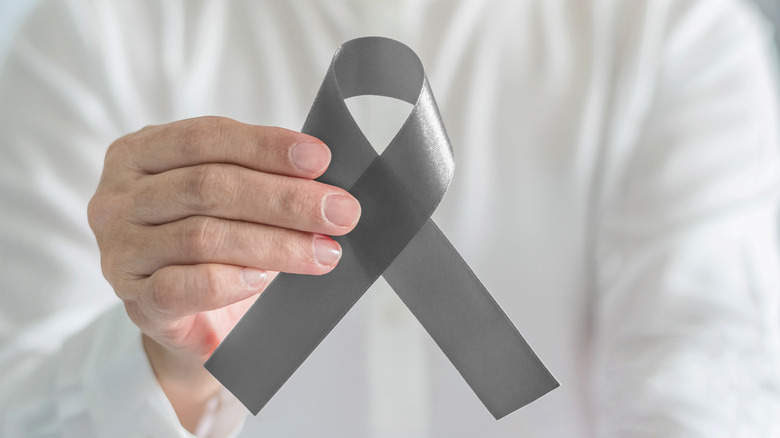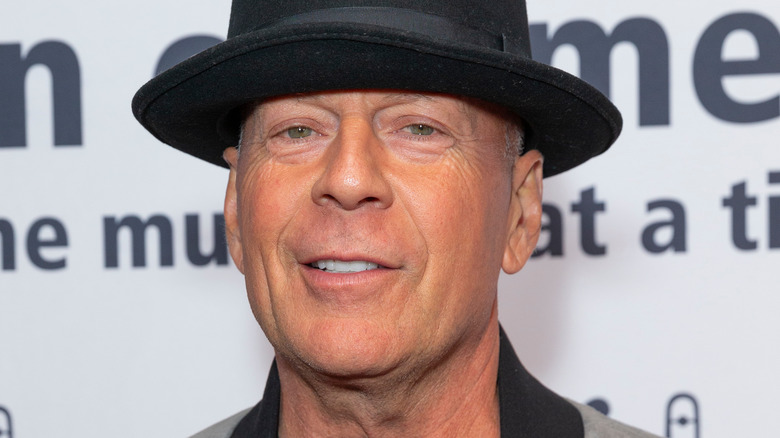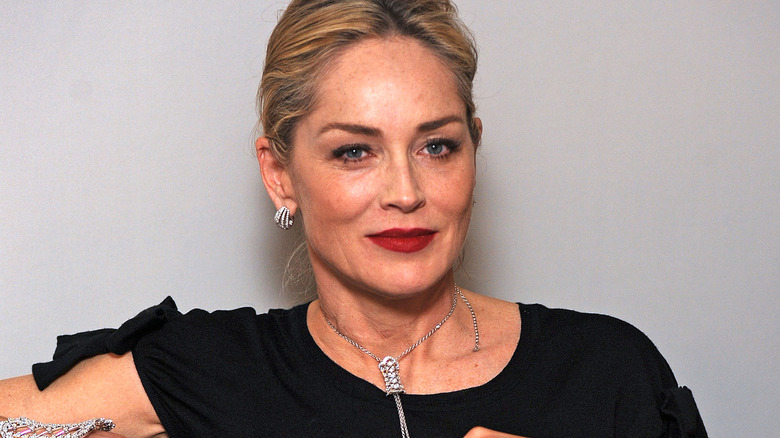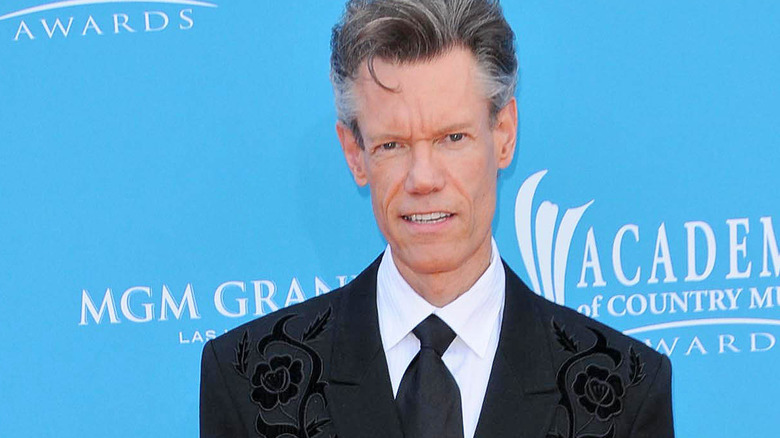Celebrities That Have Dealt With Aphasia
Bruce Willis's aphasia diagnosis in early 2022 drew awareness to a little-known condition that affects a surprisingly large number of people. The National Aphasia Association (NAA) estimates that at least 2 million people in the United States live with the disorder. Among them are many celebrities who have dealt with aphasia. But until the Willis family's announcement stole the media spotlight last March, 84.5% of Americans had never heard the term "aphasia."
According to the National Institute on Deafness and Other Communication Disorders (NIDCD), aphasia is a brain disorder that impairs a person's ability to read, write, speak, and understand other people's speech. Aphasia most commonly occurs after a stroke or traumatic brain injury. Depending on the severity, symptoms of aphasia can last from a few days to a lifetime. Although aphasia affects communication, it does not affect a person's intellect, notes the NAA.
The Mayo Clinic says that while there is no cure for aphasia at this time, partial or even significant recovery is possible with speech and language therapies. These five celebrities have tackled the challenges of dealing with aphasia and share the hope that others with the condition can live a whole and successful life.
Emilia Clarke helps others cope with brain injury
In "Game of Thrones," Emilia Clarke's fierce Daenerys Targaryen lasted right up to the final episode — an accomplishment for any character in the series. In real life, Clarke possesses the same resilience as her character. She described to The New Yorker how a severe brain aneurysm triggered aphasia and threatened to end her career after the first season. Relaying her experience, she said, "... nonsense words tumbled out of my mouth and I went into a blind panic. I'd never experienced fear like that — a sense of doom closing in. I could see my life ahead, and it wasn't worth living. I am an actor; I need to remember my lines. Now I couldn't recall my name ... In my worst moments, I wanted to pull the plug."
Clarke recovered, but her struggle wasn't over; after wrapping the third season, she had surgery to remove a second aneurysm. In recovery, she worried that permanent cognitive and sensory damage could affect her career. Today, Clarke's outlook and brain are back to 100%. Her experience inspired her to start a charity, Same You, which helps others cope with brain injury. "Recovery is long term, and rehabilitation can be difficult to access," Clarke told The Los Angeles Times. "Brain injury can be an invisible illness, and the subject is often taboo. We must help young adults take control of their recovery and allow them to open up without fear of stigma or shame."
Bruce Willis is still living it up
Bruce Willis made headlines in March 2022 when his family announced that he would be leaving the spotlight to deal with aphasia. Everyday Health reports that Willis was 67 when he received his aphasia diagnosis, forcing Willis to retire from his storied career. Aphasia has taken a toll on Willis and his family, but they are finding ways to cope. Wife Emma wrote in an Instagram post three months after the announcement, "This was the summer of self discovery—finding new hobbies, going out of my comfort zone and staying active" (via Vanity Fair).
The cause of Willis' aphasia is unknown, but shortly after the announcement, Willis' coworkers spoke about the diagnosis, saying they had noticed telltale signs that something was wrong for years (via Screen Rant). Willis had trouble remembering his lines and had to have them repeated to him through an earpiece while filming scenes. And while he had performed his own stunts throughout his career, a body double stepped in for most action shots over the last few years.
Emma's recent Instagram post continued: "My grief can be paralyzing but I'm learning how to live along side it. As my step-daughter [Scout Willis] told me, grief is the deepest and purest form of love. I hope you find some comfort in that too" (via Vanity Fair). An earlier Instagram post from Rumer Willis concurred: "As Bruce always says, 'Live it up' and together we plan to do just that."
Sharon Stone speaks out for stroke awareness
In Brain & Life, actress Sharon Stone describes her struggle to overcome aphasia after a near-fatal brain hemorrhage. In 2001, Stone noticed the first symptoms of a stroke while at home. Suddenly, a "lightning bolt" of pain shot through her head, knocking her unconscious. When she woke, she had a headache and felt confused. Symptoms spiraled, with numbness in her leg and foot, inability to speak, and profound confusion. In her confused mental state, Stone didn't think to call 911, and did not get to the hospital until three days later.
According to the American Heart Association (AHA), stroke is a major cause of disability in women and the third leading cause of death for women in the United States. Recovery options are still limited, but there were none in 2001, says Brain & Life. With fierce determination, Stone took responsibility for engineering her own recovery. She quit drinking, ate healthier, exercised, and meditated. She describes her recovery as hell, but she came out on the other side with a positive outlook.
Now, Stone is a key advocate for stroke awareness. Stone told the National Aphasia Association (NAA), "I became more emotionally intelligent. I chose to work very hard to open up other parts of my mind. Now I'm stronger. And I can be abrasively direct. That scares people, but I think that's not my problem ... It's like, I have brain damage; you'll just have to deal with it."
Randy Travis embodies amazing grace
With 22 No. 1 singles and 31 Top-10 hits, country music icon Randy Travis is an icon (via RandyTravis.com). Travis' award-winning songs are a country music staple. Superstar Garth Brooks once said of Travis, "This man saved country music, and I gotta tell you I wouldn't be standing here if it wasn't for Randy Travis" (via Taste of Country).
Then, in 2013, a heart infection nearly took Travis' life, according to Saving Country Music. Travis suffered a severe stroke while in a coma, and Doctors were unaware of the stroke for several days. According to Penn Medicine, the longer a stroke continues undiagnosed, the more brain cells die.
Travis' brush with death left him with crippling aphasia, and he spent 2 1/2 years in recovery to relearn basic skills (per NAA). Travis writes of the experience in his 2019 memoir: "I wanted to shout as loudly as I had ever bellowed, yet no words formed, no sound came out of my mouth. But a single tear trickled from my eye and down my face as I mustered every ounce of energy I had. I squeezed Mary's hand" (via Insider).
Travis continues to have difficulty communicating, but he can still sing. According to Nicki Swift, Travis stunned the audience when sang "Amazing Grace" at his Country Music Hall of Fame induction in 2016. Wife Mary says, "I think when I put that microphone in his hand, he became Randy Travis again. It was absolutely beautiful."
Gabby Giffords thrives with music therapy
Former Arizona U.S. State Representative Gabrielle Giffords was shot in the head while giving a political speech during a 2011 assassination attempt. According to the NAA, Giffords survived, but the subsequent brain trauma left her with non-fluent aphasia. In Giffords' case, this meant she could understand what other people were saying but was unable to speak in return. Giffords retired from Congress in 2012, and by 2017, she still lived with non-fluent aphasia but could speak short phrases.
The bullet hit Giffords in the left brain, the part of the brain responsible for speech and spacial recognition (per Psychology Today). Although aphasia affects speech and the ability to recognize locations, it does not impair intelligence. Giffords tells the NAA, "Aphasia really sucks. The words are there in my brain. I just can't get them out. I love to talk. I'm gabby."
Part of Giffords' recovery process includes music therapy. Per the NAA, neurologic music therapy encourages brain plasticity, which can help connect damaged brain areas to healthy brain regions to recover impaired cognitive function, including speech and movement. Music connects the left and right brain hemispheres and stimulates many regions of the brain simultaneously, making it a perfect tool for people who have suffered damage to one area of the brain. And music is healing by nature, making music therapy both effective and enjoyable.






